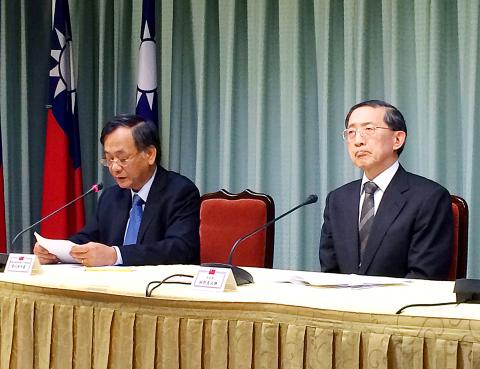Vietnam’s chief envoy to Taiwan yesterday apologized on behalf of his government to Taiwanese businesses that suffered losses as a result of the anti-China protests in his country and said his government is considering offering tax cuts and other forms of compensation to those enterprises.
Vietnam Economic and Cultural Office in Taipei Director Bui Trong Van expressed “deep regret and apologies” to the investors on behalf of Hanoi at a press conference at the Ministry of Foreign Affairs in Taipei.
He had previously offered a “personal” apology over the losses suffered by Taiwanese in his country, but was summoned yesterday by Minister of Foreign Affairs David Lin (林永樂), who asked that the Vietnamese government apologize, punish those responsible and compensate the affected investors.

Photo: CNA
Over the past few days, Vietnamese officials have been meeting with foreign investors to assess the losses and will take steps to compensate these businesses, Bui said.
Reducing or waiving land or business taxes could be one of the forms of compensation, which may also include offering the affected businesses concessional loans or debt relief on overdue loans, he said.
“The most important goal is to help companies resume normal production activities as soon as possible,” Bui said.
“It is in the interests of foreign-funded companies, the Vietnamese workers and the Vietnamese government and the country,” he said.
Lin said a deputy minister from the Ministry of Economic Affairs will lead a delegation to Vietnam this week with the aim of expediting the compensation arrangements.
“After our Ministry of Economic Affairs delegation arrives in Vietnam, we hope to gain a better understanding of and further study all compensation matters,” Lin said.
Anti-China protests erupted on Tuesday last week in Vietnam after China earlier this month deployed an oil rig near the Paracel Islands (Xisha Islands, 西沙群島), an area claimed by both Beijing and Hanoi, as well as by Taiwan.
Many factories in industrial parks in Vietnam, including several run by Taiwanese companies, were either set alight or vandalized during the protests.
Early estimates show that 107 Taiwanese businesses were vandalized, with about 10 factories having to suspend operations because of the damage.
Meanwhile, in Hanoi at a press briefing on Saturday evening, Vietnamese government officials said that Hanoi is sympathetic toward Taiwanese and other foreign investors whose businesses have been affected by the anti-China rioting there and has promised to help them resume production.
Do Nhat Hoang, director of Vietnam’s Bureau for Management of Foreign Investment under the Ministry of Planning and Investment, said that the damage to Taiwanese and other foreign companies had occurred as a result of misunderstandings and provocation by “lawless individuals.”
Vietnamese authorities are sympathetic toward those investors and are taking appropriate measures to assist them in restarting production, he said in response to questions by officials of Taiwan’s representative office in Hanoi.

SECURITY: As China is ‘reshaping’ Hong Kong’s population, Taiwan must raise the eligibility threshold for applications from Hong Kongers, Chiu Chui-cheng said When Hong Kong and Macau citizens apply for residency in Taiwan, it would be under a new category that includes a “national security observation period,” Mainland Affairs Council (MAC) Minister Chiu Chui-cheng (邱垂正) said yesterday. President William Lai (賴清德) on March 13 announced 17 strategies to counter China’s aggression toward Taiwan, including incorporating national security considerations into the review process for residency applications from Hong Kong and Macau citizens. The situation in Hong Kong is constantly changing, Chiu said to media yesterday on the sidelines of the Taipei Technology Run hosted by the Taipei Neihu Technology Park Development Association. With

CARROT AND STICK: While unrelenting in its military threats, China attracted nearly 40,000 Taiwanese to over 400 business events last year Nearly 40,000 Taiwanese last year joined industry events in China, such as conferences and trade fairs, supported by the Chinese government, a study showed yesterday, as Beijing ramps up a charm offensive toward Taipei alongside military pressure. China has long taken a carrot-and-stick approach to Taiwan, threatening it with the prospect of military action while reaching out to those it believes are amenable to Beijing’s point of view. Taiwanese security officials are wary of what they see as Beijing’s influence campaigns to sway public opinion after Taipei and Beijing gradually resumed travel links halted by the COVID-19 pandemic, but the scale of

A US Marine Corps regiment equipped with Naval Strike Missiles (NSM) is set to participate in the upcoming Balikatan 25 exercise in the Luzon Strait, marking the system’s first-ever deployment in the Philippines. US and Philippine officials have separately confirmed that the Navy Marine Expeditionary Ship Interdiction System (NMESIS) — the mobile launch platform for the Naval Strike Missile — would take part in the joint exercise. The missiles are being deployed to “a strategic first island chain chokepoint” in the waters between Taiwan proper and the Philippines, US-based Naval News reported. “The Luzon Strait and Bashi Channel represent a critical access

Pope Francis is be laid to rest on Saturday after lying in state for three days in St Peter’s Basilica, where the faithful are expected to flock to pay their respects to history’s first Latin American pontiff. The cardinals met yesterday in the Vatican’s synod hall to chart the next steps before a conclave begins to choose Francis’ successor, as condolences poured in from around the world. According to current norms, the conclave must begin between May 5 and 10. The cardinals set the funeral for Saturday at 10am in St Peter’s Square, to be celebrated by the dean of the College